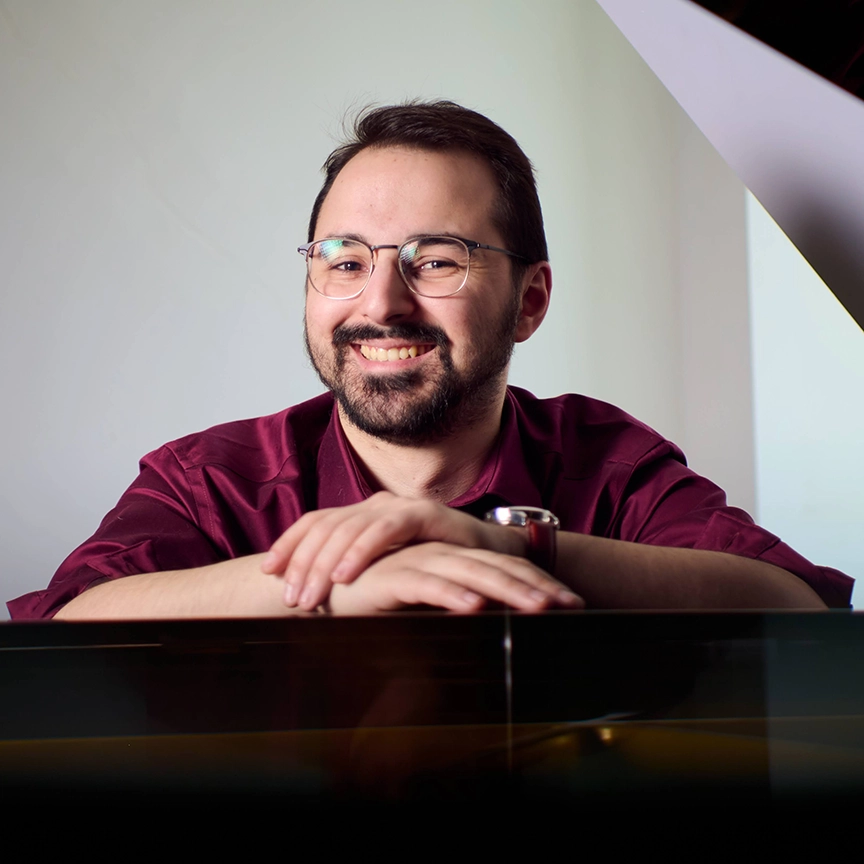For Eric St. Godard, music has been a pillar of strength, creativity, and self-discovery—a constant presence that has helped to shape his identity and guided his path through life. While jazz is his main focus, Eric has taken influences from the spheres of straight-ahead-swing, bebop, fusion, rock, classical, and hip hop to mould his musical journey into a sound and stories that any generation can groove to and appreciate. Eric’s willingness to look beyond musical boundaries for inspiration has informed his teaching philosophy, allowing him to offer students a broad, inclusive and creative exploration into the world of music education.
Eric has taught students of all ages—from 4 to 60 years old. This wide range of age and skill levels has given him the ability to adapt to each student’s unique needs and interests, creating a supportive environment where they can grow and explore their own musical path. He also incorporates mindfulness and breathwork into his lessons, helping students feel more grounded and at ease. This slower, more intentional approach deeply influences how they practice and perform—an essential skill in today’s fast-paced, attention-driven world.
Outside of the teaching world, Eric also leads The E4 — a quartet which recently toured Western Canada in preparation of their first full-length album for release in fall 2025.
What is your education and experience?
B. Mus – Jazz Performance (Piano) – Brandon University
M.Mus – Performance (Jazz) – University of Manitoba
Tell us about one of your fondest musical memories.
In May 2025, I did a tour of Western Canada with my quartet with four of my closest musical peers. 50-plus hours in the same vehicle for two weeks sure was fun, but what was even more fun was that we shared our music with new audiences almost every day of the tour. To me, there are very few moments that match the bliss of connecting with people through music (except for when my three cats greet me at the door, of course). Sometimes you really reach someone, and when you see that happen, you realize this is what music is about—connection. It’s such a beautiful, basic human need that sometimes we struggle to have with our busy lives.
What made you decide to study music?
Since I started piano at four years old, music was always something that came naturally. I worked hard in school, worked hard at practicing, but music always was much easier (and way more fun) than school work. I would spend hours during the weeknights playing along to TV show themes, and when I first encountered jazz—Oscar Peterson and Bill Evans—at 10/11 years old, I knew I wanted to play like that. When I got to high school and enrolled in the jazz band program, that was the pivotal moment that really started my path toward music. There was so much freedom in the music, so much to absorb. I wanted to keep that going!
How are your lessons unique?
The pandemic really altered the way we socialize, and it could not be more true with the younger generations. In my experience of teaching young students, I have noticed that many have become increasingly shy. Part of that is from the digital device age that we are living in, and I understand how important it is to make those connections with real people, face-to-face. That’s why I always try to build a solid relationship with each student through the best tools that us humans have: conversation and improvisation. Whether it be asking a simple question like “How was your day?”, or “What did you do today that was super cool?”, I believe that communicates to the students that not only are you there to teach them a really cool instrument (and in my opinion the best one), but that you care about them as people. Sometimes we may talk about cars, soccer, school tests for 3-5 minutes before we start going into the lesson material, other times we might go right into playing. Other times, we may play an improvisation game to start off, because I believe giving students the freedom to come up with their own ideas greatly enhances their ability and willingness to take risks to be creative. Both approaches help to create trust between the student and teacher.
What’s your favourite part about teaching?
I think the most beautiful part of teaching is seeing your students grow—not only their skill level, but in their personalities. When you stick with a student long enough on their musical journey and observe how music changes their self-image, or you hear from others how lessons have brought them new friends, it truly is a wonderful experience.
What would you say to someone who is interested in studying music?
Don’t be afraid. It can seem really daunting to know that there’s so much musical information that you don’t know about yet; the fear of the unknown. Or, the fear of failure. In my opinion, failure is the foundation of building strong people. You have to travel through tough times in order to have success, and the study of music is full of twists and turns, just like life. Perseverance will get you a really long way!

